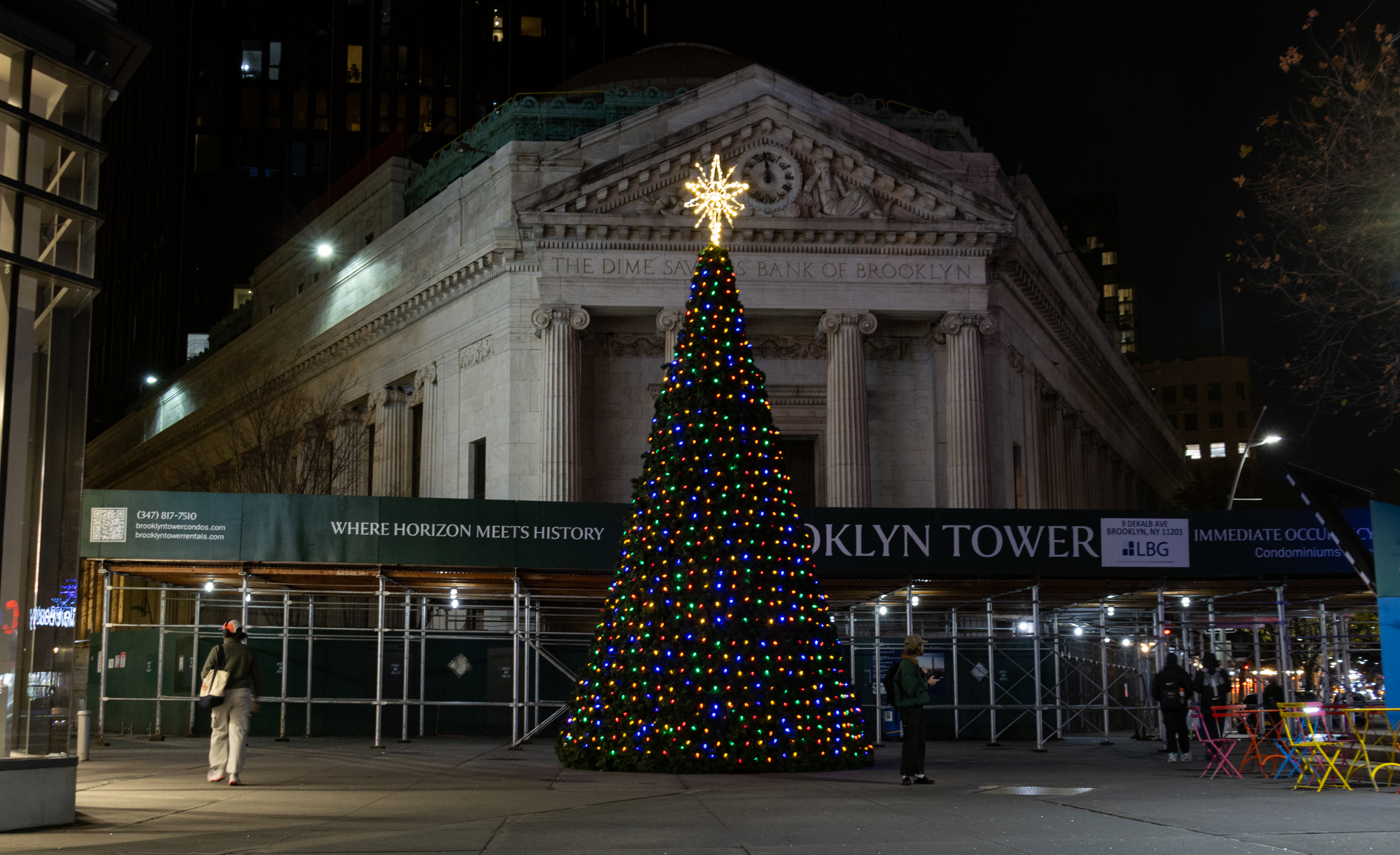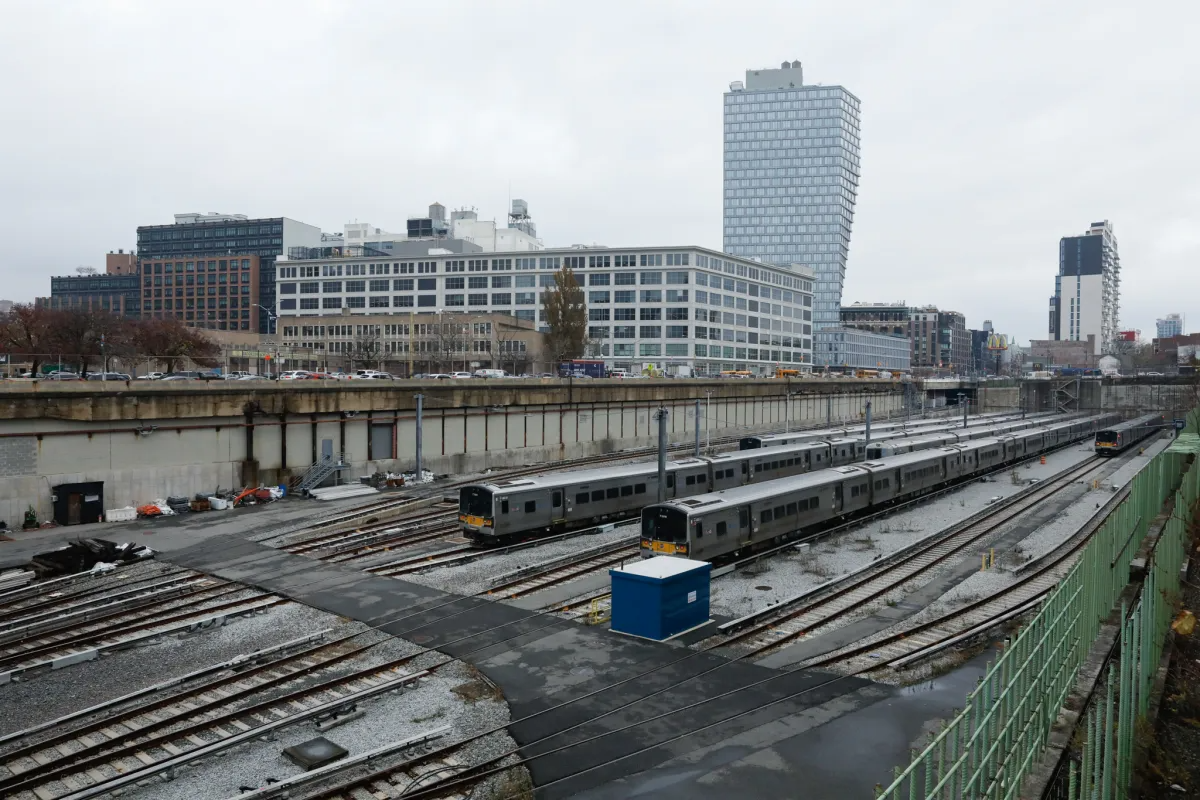Thursday Links
Clyde 3YB. Photo by BH-THE BOYS. Freddie Mac’s Big Loss Dims Hope [NY Times] Brooklyn Subway Cars Rate High [Brooklyn Eagle] Competition for Kosher High-End Supermarkets [Crain’s] 2007 Mortgages Go Bad at Rapid Rate [WSJ] Parking Program Would Give Preference to Locals [NY Sun]


Clyde 3YB. Photo by BH-THE BOYS.
Freddie Mac’s Big Loss Dims Hope [NY Times]
Brooklyn Subway Cars Rate High [Brooklyn Eagle]
Competition for Kosher High-End Supermarkets [Crain’s]
2007 Mortgages Go Bad at Rapid Rate [WSJ]
Parking Program Would Give Preference to Locals [NY Sun]





What, how many days do we have left again? I had a few things on my list to do before we’re all toast (e.g., skydive, learn to ballroom dance, ride the Trans-Siberian Express across Asia, shower in a waterfall, go to Walden Pond and read Thoreau while drifting in a canoe, make love while skinny-dipping at midnight in the South of France, have the cashier at Gristedes actually give me the correct change, etc.) and want to be sure I get to them.
This is for you, The What. Please read it and explain to me why you are right, and the economists are wrong:
****
Economists Plumb the Depths of the Downturn
NYTimes, August 5, 2008
Even if the economy continues to deteriorate, economists generally agree that the United States is not heading for another Great Depression.
Not only are the conditions far less dire, eight economists said in interviews, but the government is playing a heightened role in trying to cushion the impact of the housing downturn, losses at financial institutions and rising unemployment.
“The government is larger now and it acts as an anchor,†said Richard Parker, senior fellow at the Shorenstein Center at Harvard. “During the Great Depression, the government had neither the means nor the capability to serve as a backstop.â€
But the economists — who range from academics to policy researchers, liberals to conservatives — disagreed about just how bad this economic slowdown, led by the worst housing slump since the Depression, could be.
“I think we’ll see a miserable job market and, consequently, an eroded standard of living for the vast majority of Americans for several years,†said Lawrence Mishel, president of the Economic Policy Institute, a liberal research organization in Washington.
“This is indistinguishable from a recession for a working family,†Mr. Mishel said. “They’re losing jobs, and they’re getting a double bite as wage growth slows down and inflation kicks up. People are losing out on both ends.â€
But others said that the economy would probably grow in the second half of this year, although at a low 1 to 3 percent pace.
“You read the headlines and you look around and you think the world is coming to an end,†said Charles W. Calomiris, a visiting scholar at the American Enterprise Institute, a conservative research group in Washington. “But I don’t think so. If you’re going to tell a worst-case scenario story at this point, it’s only going to be because the Fed loses control.”
The Federal Reserve and the Treasury Department have already stepped in. The Fed has cut its benchmark federal funds rate to 2 percent, from 5.25 percent last August, though it left rates unchanged at its meeting on Tuesday.
In March, the government worked out a rescue plan for Bear Stearns when it became clear the investment bank was on the brink of collapse. And last month, Congress approved legislation that includes money for homeowners facing foreclosure and a possible bailout of the mortgage giants Fannie Mae and Freddie Mac.
Most of the economists who were interviewed blamed Alan Greenspan, the chairman of the Federal Reserve from 1987 to 2006, for his unwillingness to clamp down on either the technology stock bubble or the run-up in housing prices.
“The Fed isn’t the whole story, but it’s a big part of it,†said Gerald P. O’Driscoll Jr., who was vice president of the Federal Reserve Bank of Dallas from 1982 to 1994 and is now a senior fellow at the Cato Institute, a libertarian research organization in Washington. “It allowed these absolutely insane bubbles to happen. The lesson is, you can’t let these bubbles continue unabated with no policy making.â€
But the economists said others were to blame, too: investors, banks and rating agencies, as well as the current chairman of the Federal Reserve, Ben S. Bernanke, and the Clinton and Bush administrations.
“They thought it was just a great thing that the stock market kept going higher and higher,†said Dean Baker, co-director at the Center for Economic and Policy Research, a liberal research group in Washington. “Then, of course, Wall Street just ran wild. It was some mix of irresponsibility and downright greed. They’re all sort of on the hook, but Greenspan sits front and center.â€
The economy’s woes might have been preventable, the economists all agreed, if the actors involved had made more realistic assumptions about the future. And about the laws of gravity.
“People are way too willing to extrapolate from history,†said Jan Hatzius, chief domestic economist at Goldman Sachs. “If it’s 2005, you can’t look at a 40-year run of data and say, ‘It must be a law of nature that housing prices never fall.’ â€
The fact that average wages have not kept up with inflation has compounded the economy’s problems. Unemployment has also been creeping higher. Still, joblessness remains at 5.7 percent, while in 1933, one-quarter of the American work force was unemployed. In addition, the economy lost one-third of its value from 1929 to 1933.
Peter Cappelli, a management professor at the Wharton School at the University of Pennsylvania, compared the current battered economy to a boxer.
“The punches haven’t stopped long enough for him to catch his breath,†he said. “If the punches would stop, even for a second, the economy could catch its breath and pick itself up.â€
The conservative economists said they thought market forces would play a dominant role in turning around the economy.
“This economy will get back on its feet, no thanks to Washington,†said J. D. Foster, senior fellow at the Heritage Foundation, a conservative research group in Washington. “There’s not much that politics can do at this point for the markets.â€
Mr. Calomiris of the American Enterprise Institute said: “We do need some regulation — smarter regulation — to prevent the abuse of the safety net. But first we need to fix our broken regulations.â€
But the liberal economists said what was needed was a combination of government regulations and policies, international negotiations, lower commodity prices and stabilization in the financial sector, including Fannie Mae and Freddie Mac.
All the economists agreed that regulators should have been looking more closely at Fannie and Freddie.
“Everybody turned a blind eye,†Mr. O’Driscoll of the Cato Institute said. “The Fed deliberately and consciously refused to regulate the mortgage industry like it was supposed to have done. I’m not a big fan of government regulation, but sometimes the government can do something to help — and in those cases, it has to.â€
Mr. Parker, from Harvard, said: “Wild fluctuations have made it harder and harder for the average American family to improve their lives. You
Montrose,
your “such tiny cogs in the wheel of commerce”
is poetry.
Now I will address the Assholes. You think it’s real cute yapping around me like a little dog. I know you think you gaining love points with the other Asshats and Brownstoner on this Blog but ask yourself one question? When the shit hits the fan, what do you think I’m going to do??!!! Huh??!! As you watch the Stock Market implode and Interest Rates rocket to the moon and Government services get cut, what do you think I’m going to do??!!
I will never let you forget it.
Enjoy.
The What
Someday this war is gonna end…
Don’t worry so much, we’ll carry on paying for “Social Security, Medicare and Education” like we’ve been doing all our working lives.
I really think you should add a question mark to the end of your name, it’d be consistent with your continual cluelessness.
I hope when this shit goes down in flames, people will not ever have access to money again. 80% of American are fucking stupid. You are witnessing the greatest transfer of wealth is history. If you want a deeper understanding please read Manias, Panics, and Crashes: A History of Financial Crises by Charles P. Kindleberger. This book puts in prospective about Mutant Asset Bubbles who lose and who benefits.
Most of you Assholes are saying “I’m in it for the long haul” yeah fucking right! This is delusion telling you everything is O fucking K, well it’s not. The Banking System is BROKEN! Government will have to be the lender of the last resort. The Big Boys on Wall Street will leave this Country so fucking broke services like Social Security, Medicare and Education will have to be cut. Plus The Baby Asshole Boomer Population is retiring in a few years, that will put more stress on our system. The sad thing is that you are too fucking stupid to be upset at the Raping of America. You are part of the problem and the Depression 2 will be the solution. Go fuck yourselves!
The What
Someday this war is gonna end…
I’m with Montrose- only so much we can freak out over or do about it. Although I do still have emotionally satisfying if unrealistic vision of all of us marching through the streets with our torches to the castles of commerce and burning the evil Frankenfinance monster.
The thing The What DIDN’T post is that the article stated that home prices may fall up to an additional 9% before turning upward again.
9%. Big freakin deal for those of us who plan to stay in our homes.
And that’s 9% average nationwide.
I don’t don’t NYC will/is correcting, but last I heard, they are calling for 5-10%. Not a huge concern for 99% of the population.
It’s not that most people don’t give a shit, it’s that: 1) most people are in their homes for the long haul, God willing. 2)Most people are stepping back and cutting back on frivolous spending, and are trying to save more. 3)There’s not much we can do about it anyway.
Freaking over the economy is like waiting for the next terrorist strike. You can choose to do one of several things – hole up in a bunker in your basement, leave altogether, or go about your daily life because no one knows when anything will or will not happen. Most people I know, including myself, are such tiny cogs in the wheel of commerce that we can only watch what we spend, try to put our small investment, like a retirement fund, where it will make the best return in the long run, and hope for the best.
The What seems to take special glee in seeing the system and those working it, go down in flames. I don’t understand that, because unlike Nero watching Rome burn from a parapet, if the country goes belly up, we are ALL going to be in trouble, including him.